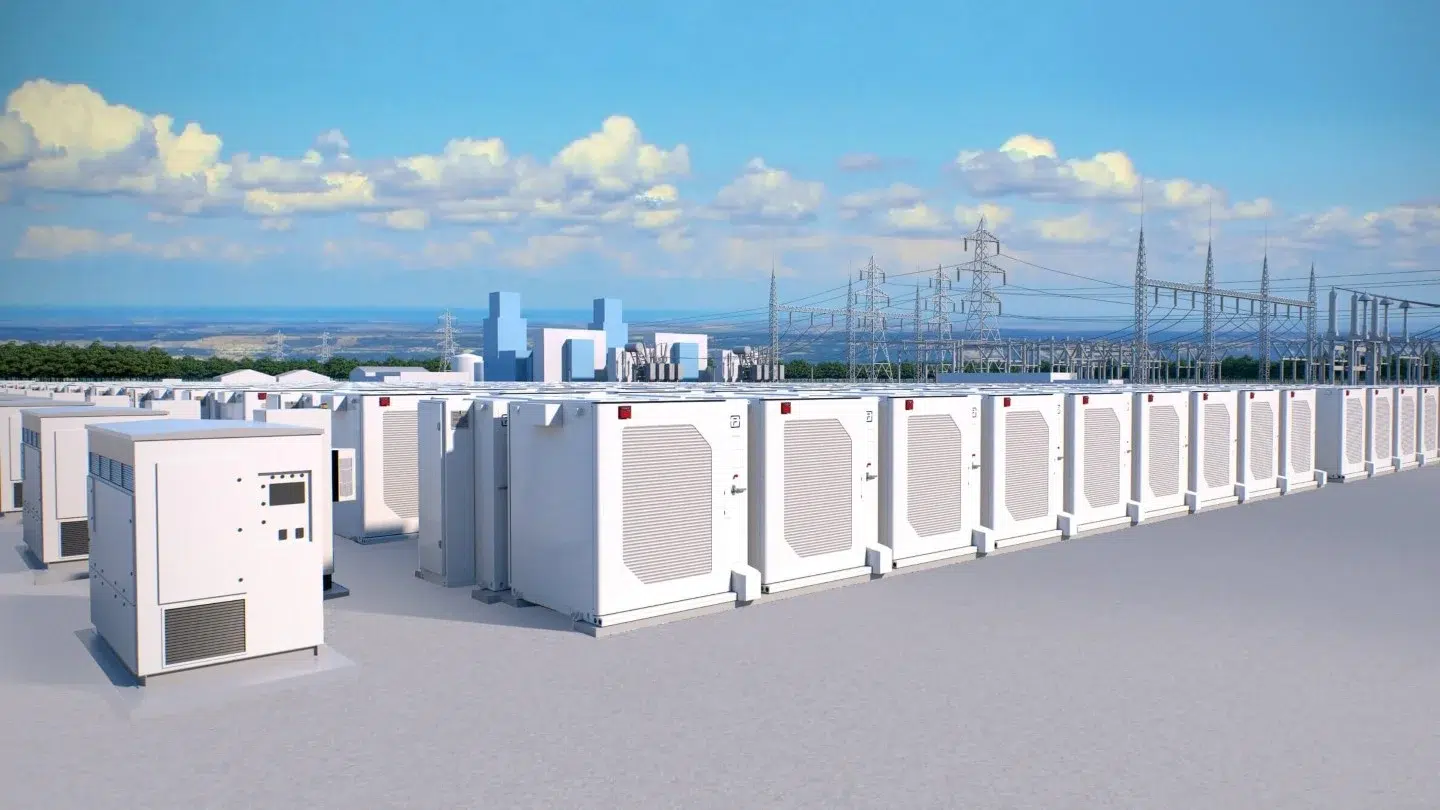
Abstract
If you’re unsure how to store energy or if current storage methods are too costly, this article can help you understand battery energy storage systems comprehensively. It covers what they are, what they offer, their types, lifespan, applications, and advantages. This knowledge can help you choose a more suitable solution for storing and optimizing energy.
What Is Battery Energy Storage System(BESS)?
A battery energy storage system is a method of converting electrical energy into chemical energy using specialized battery technology for later use. It’s a highly efficient energy storage solution, especially in today’s global pursuit of sustainable green energy. Its technology is continually evolving, and its applications are expanding, making it a very promising choice for energy applications.
Battery Energy Storage System(BESS) Components:
Classification of BESS by Battery Types
1. Lithium-ion batteries
Lithium-ion batteries work by moving lithium ions between positive and negative electrodes. They’re rechargeable and known for their high energy density, lightweight design, and are commonly used in portable devices, electric vehicles, and more. They’re also environmentally friendly and have high thermal safety. Currently, about 90% of devices in the market use lithium-ion batteries, with common models including 12v, 24v, and 48v lithium-ion batteries.
2. Lead-acid lead acid batteries
Lead-acid batteries work by a chemical reaction between the active material lead dioxide and sulfuric acid in the electrolyte. They have a simple process, low cost, but low energy density, so they’re bulky and heavy. They also require regular inspection and maintenance.
As the two most common energy storage batteries, we have a more comprehensive guide for you to read: “Lithium Battery vs Lead Acid Battery“
3. Sodium Sulfur batteries
Sodium-sulfur batteries are high-efficiency energy storage batteries made of liquid sodium and sulfur. They are cost-effective and have a long lifespan. However, sodium polysulfides are highly corrosive and must be kept away from oxygen and water. They are mainly used in energy storage fields like solar power stations.
Also known as zinc-bromine flow batteries, the electrodes themselves do not undergo chemical reactions, and the electrolyte is a water solution, making them highly safe. They do not contain heavy metals, so they are also an environmentally friendly battery option. Currently, they are used in ship propulsion systems, power grid peak shaving, electric vehicle charging stations, communication base stations, and other locations.
5. Flow batteries
Liquid batteries are batteries where both the electrode material and the electrolyte are liquid. Their power and capacity can be specially designed, making them suitable for large-scale energy storage. In terms of applications, they are used in the military for high-performance and reliable backup power for missiles, drones, and other equipment. In civilian applications, they are used in security devices, emergency rescue equipment, and other areas.
Battery module
As the name suggests, it’s a module made up of multiple battery cells connected in different ways, assembled together with protective equipment and other components.
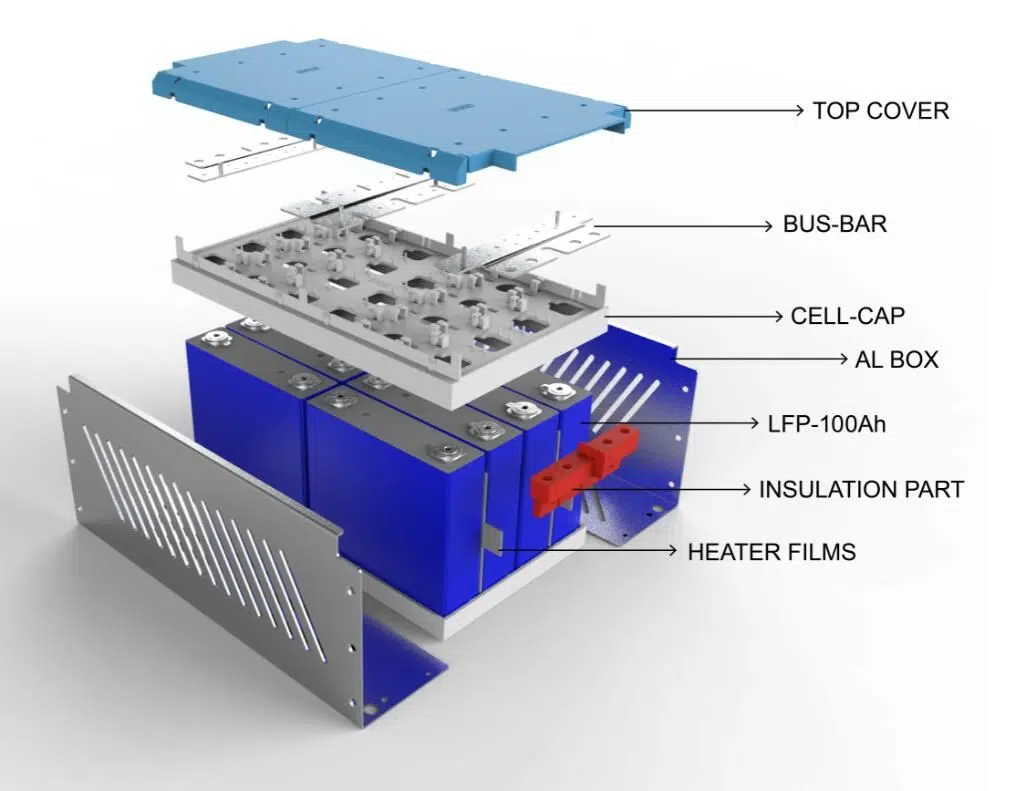
Battery cluster
It consists of battery modules, battery management systems, detection, and protection circuitry components. The battery management system is like the brain of the entire battery system, protecting the battery from damage.
Inverter
An inverter is a device that changes the direct current (DC) electricity collected by solar panels into the alternating current (AC) electricity used by households. There are different types of inverters: Grid-Tie Inverters, Off-Grid Inverters, and Hybrid Inverters.
Grid-Tie Inverters connect to the public electricity grid, allowing users to exchange excess energy for credits on their electricity bills and prevent wastage of energy.
Off-Grid Inverters are suitable for areas where access to the public grid is difficult, providing independence from the main electricity supply.
Hybrid Inverters combine features of both types. They can feed energy into the grid while also storing energy in batteries for backup, making them versatile for various energy needs. This shows how adaptable Battery Energy Storage Systems (BESS) can be.
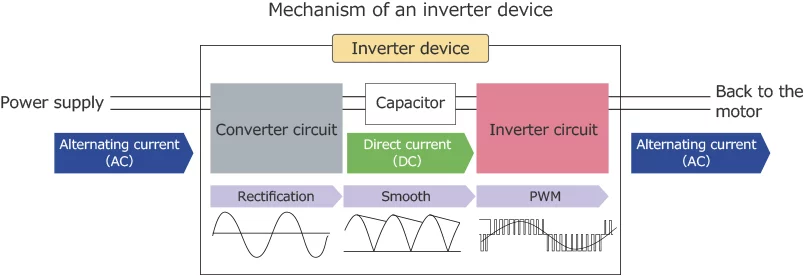
Charge Controllers
Just as BMS is the brain of the battery system, the controller can be considered the brain of the entire BESS. It prevents issues like overloading and deep battery discharge, coordinating vital components to ensure the orderly operation of the BESS.
What are the main types of battery energy storage systems?
There are two main types of energy management systems based on how they control energy from the grid and where the electric meter is positioned: Behind-the-Meter systems and Front-of-the-Meter systems.
Customers can choose the system type that best fits their needs based on their own preferences and requirements.
Or directly contact us to provide you with a professional battery energy storage system design
Behind-the-Meter systems (BTM)
This industry term refers to energy systems used for residential homes and commercial buildings. These systems generate and store energy separately from the grid, so they don’t rely on electric meters for calculations. However, please note that they’re placed behind the electric meter, which doesn’t mean they’re “off-grid.” This setup allows electricity to be sent through the grid when solar panels aren’t in use due to lack of sunlight, and billing may still rely on the grid during these times.
Front-of-the-Meter systems (FTM)
Now it’s easier to understand Front-of-the-Meter systems (FTM). These are larger-scale power supply systems, such as power plants and wind farms. The energy they use needs to pass through the electric meter before being delivered, hence they’re considered “in front of” the meter.
Applications of BESS:
For commercial and industrial users
Load shifting
To understand load shifting, let’s first understand what “electric load” means. Simply put, it refers to the facilities using electricity. In areas with different population densities, the level of electric load varies greatly. Load shifting aims to reduce costs and the threshold for consumption during peak times.
Using Battery Energy Storage Systems (BESS) for load shifting allows for effective and high-quality energy management over time. For example, during sunny days when there’s abundant energy in the grid, it can be stored for later use.
Peak shaving
During periods of high electricity usage, the power grid experiences pressure. By using Battery Energy Storage Systems (BESS) to peak shaving energy storage during these times and releasing it when needed, we can smooth out peak demand, which helps reduce electricity costs.
Flexibility
BESS regulation is flexible, meaning it’s manageable in storing and releasing energy, and it’s versatile in its own use. It can be paired with various types of inverters, including grid-tied, off-grid, and especially hybrid ones. It can easily adapt to users’ needs regarding grid demands and consumption costs.
For Residential users
Self consumption
Individual users can make their lives more convenient. For example, while they’re at work during the day, their homes can store solar energy, which they can then use to power their household devices at night through the energy storage system. This helps reduce their energy bills.
Going off the grid
Completely disconnecting from the grid is a backup sustainable energy solution, especially in remote areas. It’s also the preferred choice for customers seeking independence in their energy needs.
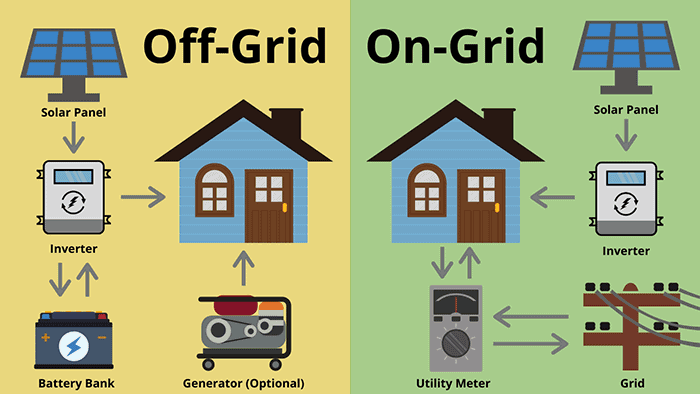
Advantages Of Battery Energy Storage System
Environmental Gains
The reason we pursue green energy alongside non-renewable resources is because the latter can harm the environment. Solar energy, wind power, and similar natural resources are the best energy sources. Renewable energy power can effectively reduce pollution and contribute to environmental protection.
Lower Energy Costs
Using BESS, by employing various application methods, reduces the consumption cost during peak electricity usage, increase energy efficiency ultimately leads to lower cost. You don’t need to worry about impacting quality of use or experiencing power outages, as it operates around the clock.
Less Dependent On the Grid
For example, to compensate for the consumption of non-renewable resources, society has begun to develop and research the application of renewable resources. BESS can also effectively reduce households’ reliance on the power grid. During peak electricity usage, weather-related factors, and other circumstances, BESS can ensure a consistent and stable power supply. You can also learn more about why solar batteries are the best choice for your off-grid needs.
How Long Is the Service Life of A Battery Energy Storage System?
Generally, the lifespan of BESS ranges from 5 to 15 years, and there are many factors that can affect its lifespan, such as the type of storage battery used and the temperature of the operating environment. To prolong the lifespan of BESS, you can control the temperature by using insulation materials, regularly clean and inspect the equipment for issues. Timely repairs and part replacements are also crucial.
GYCX’s Efforts In this Field
GYCX is a one-stop-shop industry specialist. We rigorously control our products and conduct on-site inspections of our suppliers. Providing high-quality end-to-end services to our customers is our fundamental brand philosophy. Choose us, and from consultation to after-sales, you’ll have a seamless experience. We’ll be your professional partner every step of the way.
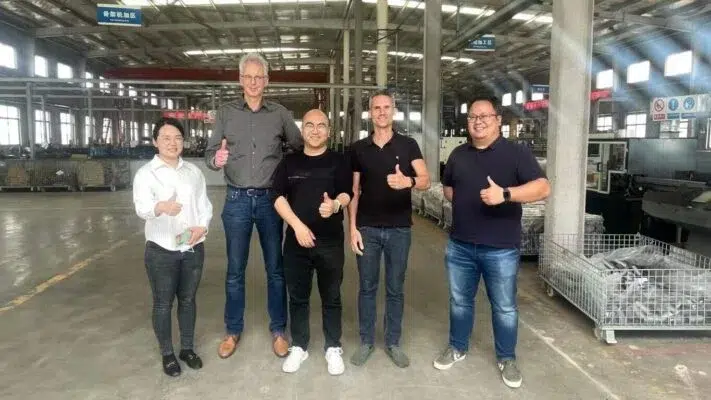
If you need any related services, feel free to contact us anytime. We’ll design a solution that perfectly fits your needs. Don’t hesitate!
Collaboration starts now.
Perhaps you want to learn more:
1.How Long Do Solar Panels Last?(2024 Guide)
2.Maintenance of Solar Panel: 2024 Ultimate Guide
3.Will Solar Panels Save Me Money?
